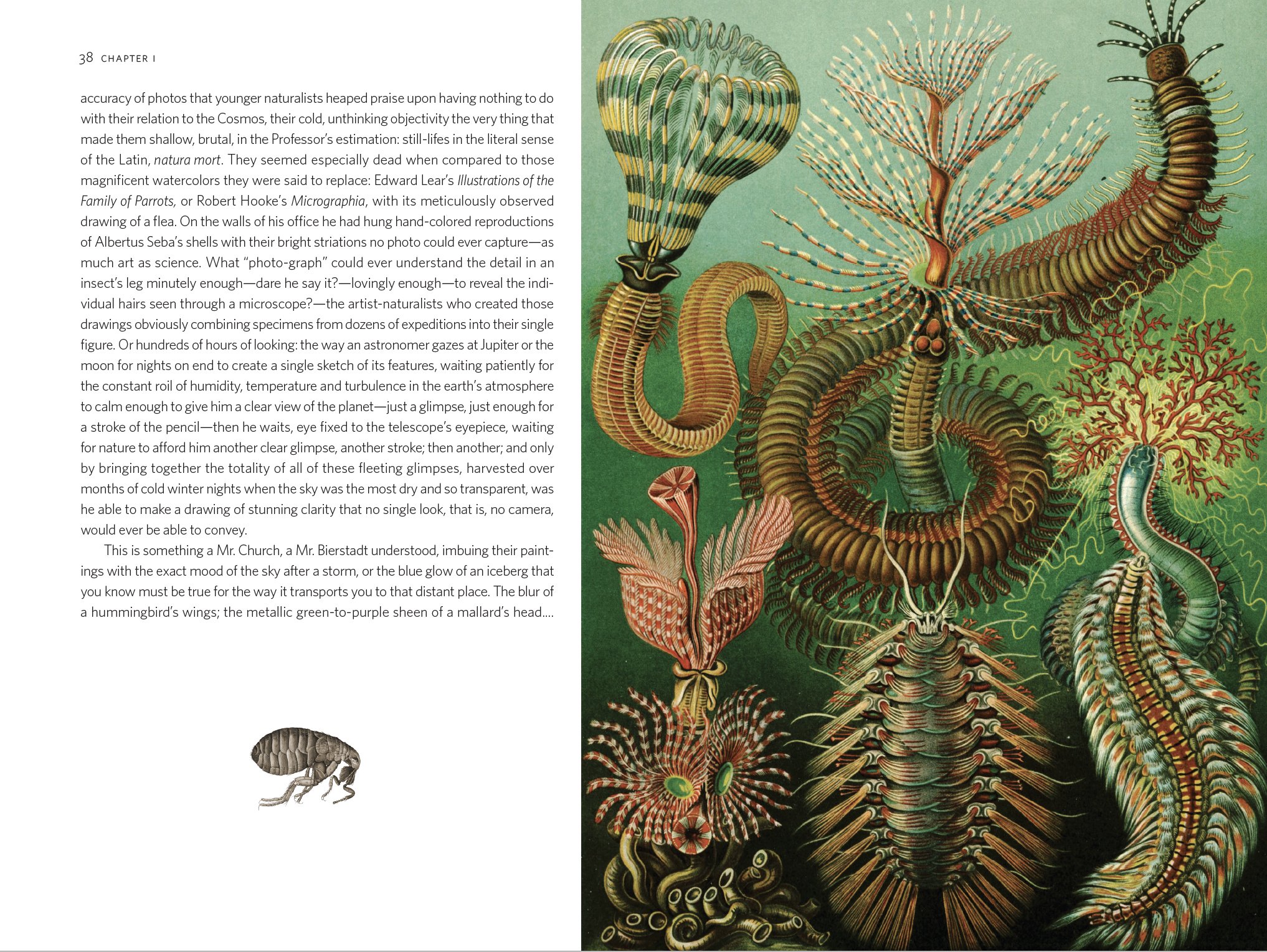
Ascension: A Novel
A visual epic of humankind's vexed relationship with nature.
Ascension is a novel of the end of Nature. Or rather, the end of three “natures”: the time just before Darwin changed the natural world; the 1980s, just as the digital and genetic revolutions begin to replace “Nature” with “environment”; and today, a time when we have the ability to manipulate nature at both the scale of the planet and the genome. The novel follows three different biologists on the brink of each of these cultural extinctions to explore how nature occupies our imaginations, and how our imaginations bring the natural world, and our place in it, into existence.
Across a scale of centuries, the story draws on the materials of these eras to tell its tale, from 19th century engraving, to 20th century photography, to 21st century databases. It opens with a 19th century, natural philosopher struggling to read the natural history of a Divinely created world as evolution, photography, and the rest of the modern world are beginning to change the very meaning of “Nature.” His Indigenous-Spanish guide feels his own natural world coming to a close under encroaching pressures as he leads the natural historian to a rumored fossil of an enormous bird in the primordial forests of Paraguay. The novel then moves to the 1980s and the “Jane Goodall” of feather-lice, an entomologist, at a time when women in the sciences were not considered “natural.” The first to see that birds are dinosaurs, her quest for proof becomes a quest for her own identity as she races to use methods she’d honed over a lifetime before they are driven into extinction by the gene sequencing and digital technologies that are coming into existence. Finally: our own post-biological moment—the Anthropocene. “Nature” has been supplanted by “environment” while genetic engineering, and data-mining dominate the way we understand it. This chapter brings together researchers, soldiers, tourists, adventurers, data-miners, information designers, venture capitalists, eco-“terrorists,” artists, and a tangle of trajectories around the engineering of insects—maybe to eradicate disease, maybe to weaponize them in wars over water and other resources—in a natural world on the brink of extinction.
Together the three chapters tell the story of humans yearning to understand themselves, their relations, and indeed humanity, by understanding the natural world and their place in it as it comes to a close. As the histories and lives of these characters connect, a picture emerges of a society at a time when the manipulation of nature changes how we see ourselves and others, while mass migrations, extinctions, and erratic weather compete with the virtual for our imaginations: the coming new “natural.”









“Steve Tomasula has opened up a lyric, atmospheric experience for readers across time and space, playfully, beautifully, and sometimes frighteningly staged upon the page. In Ascension, the interplay between the human longing to understand who we are and our unstoppable will to pursue knowledge—in all of our creations and destructions—are laid bare. What an epic story across three epochs of being and knowing—from Darwin to the digital revolution to the present tense. Breathtaking.”
—Lidia Yuknavitch, author of Thrust: A Novel
“In this epic-scale novel, Steve Tomasula uses multiple modalities and media formats to track the course of ecological impacts and change. From illustrations of contact encounters, to a movie script, to elaborate aerial views and data visualizations, Tomasula demonstrates his unique capacity to engage with technologies of knowledge in constructing his provocative narrative. As always in his projects, the result is a striking work of combined intellectual and creative force. He makes vividly evident the terrifying reality of our current dystopia as we careen towards disaster—starting with the epigraph ‘it did not have to happen this way.’”
—Johanna Drucker, author of Iliazd: A Meta-Biography of a Modernist
Tackling the catastrophes of colonization, digitization, and encroaching extinction, what history feels like at a scale where homo sapiens become the size of stray thoughts, Ascension is both a brilliant contemplation of just how wrong we’ve become, how poorly we’ve read the text of our planet and ourselves, and a keen exploration into how we represent these unimaginables through our culturally-inflected imaginations. Rich with vast research, thought, illumination, every page a unique visual space, Ascension is, like all Steve Tomasula’s work, a mind-boggling report sent back from the library of the future.
—Lance Olsen, author of Skin Elegies and My Red Heaven
“Ascension asks us to look closely at a vast swath of time and space, not to dream past the earth but to understand how it and we got here and where we’re all going. … On a planet careering toward epochal change, and for humans deeply and blindly engaged in accelerating the end of the Anthropocene, such Fi that exposes the lie of Sci, and its power to rewrite the world, is exactly what we need to be reading right now.”
—Mary Holland, American Book Review